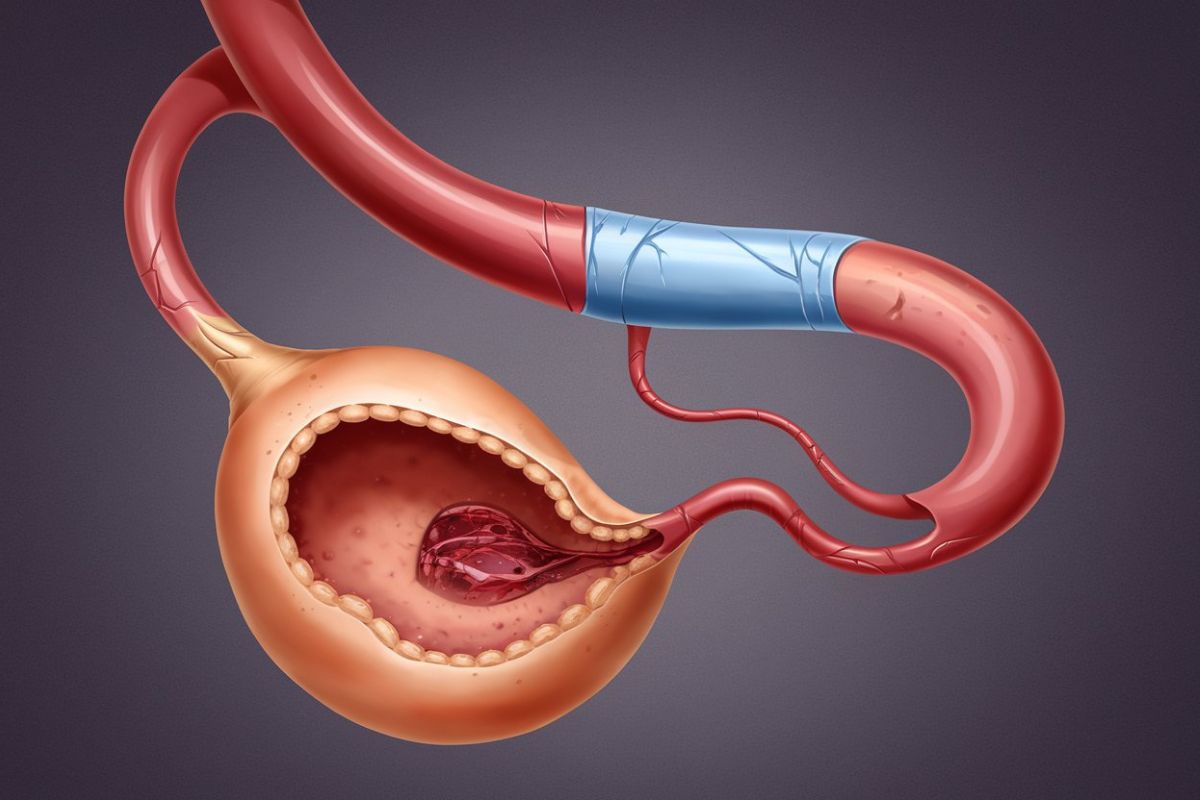
What is umbilical cord ulceration? Umbilical cord ulceration is a rare condition where the umbilical cord develops sores or ulcers. These ulcers can cause complications for both the baby and the mother. Understanding this condition is crucial for expecting parents and healthcare providers. This blog post will share 25 essential facts about umbilical cord ulceration, covering its causes, symptoms, potential risks, and treatment options. By the end, you'll have a comprehensive understanding of this uncommon but significant medical issue. Let's dive into these important details to ensure the best care for both mother and child.
Key Takeaways:
- Umbilical cord ulceration is a rare condition that can affect a baby's blood supply. Early detection through ultrasound is crucial for prompt treatment and management.
- Research is ongoing to understand the causes of umbilical cord ulceration and develop better detection methods and treatment options. Increased awareness and education can help expecting parents and healthcare providers prepare for this rare condition.
What is Umbilical Cord Ulceration?
Umbilical cord ulceration is a rare condition that affects the umbilical cord, the lifeline between a mother and her unborn baby. Understanding this condition is crucial for expecting parents and healthcare providers. Here are some fascinating facts about umbilical cord ulceration.
-
Umbilical cord ulceration involves the formation of ulcers on the umbilical cord, which can compromise the baby's blood supply.
-
This condition is extremely rare, with only a few documented cases worldwide.
-
The exact cause of umbilical cord ulceration remains unknown, making it a challenging condition to predict or prevent.
-
Some researchers believe that umbilical cord ulceration may be linked to maternal infections or autoimmune disorders.
-
Symptoms of umbilical cord ulceration can include abnormal bleeding from the umbilical cord and signs of fetal distress.
Diagnosis and Detection
Detecting umbilical cord ulceration early can be lifesaving. Here are some key facts about how this condition is diagnosed.
-
Ultrasound is the primary tool used to detect abnormalities in the umbilical cord during pregnancy.
-
Doppler ultrasound can help assess blood flow through the umbilical cord, identifying potential issues like ulceration.
-
In some cases, umbilical cord ulceration may not be detected until after birth, during a physical examination of the newborn.
-
A detailed medical history and physical examination of the mother can provide clues about potential risk factors for umbilical cord ulceration.
-
Amniocentesis, a procedure where amniotic fluid is sampled, can sometimes help diagnose underlying conditions that may contribute to umbilical cord ulceration.
Treatment and Management
Managing umbilical cord ulceration requires prompt medical intervention. Here are some important facts about treatment options.
-
If detected early, close monitoring of the pregnancy can help manage umbilical cord ulceration.
-
In severe cases, early delivery may be necessary to protect the baby's health.
-
Steroids may be administered to the mother to help mature the baby's lungs if early delivery is anticipated.
-
After birth, the baby may require immediate medical attention to address any complications arising from umbilical cord ulceration.
-
In some cases, surgical intervention may be needed to repair the damaged umbilical cord.
Potential Complications
Umbilical cord ulceration can lead to several complications, both for the mother and the baby. Here are some facts about these potential risks.
-
One of the most serious complications is fetal hypoxia, where the baby does not receive enough oxygen.
-
Umbilical cord ulceration can increase the risk of preterm birth, which can lead to additional health challenges for the baby.
-
In rare cases, umbilical cord ulceration can result in stillbirth if not detected and managed promptly.
-
Babies born with umbilical cord ulceration may have a higher risk of infections due to the open ulcers.
-
Mothers with a history of umbilical cord ulceration in one pregnancy may have an increased risk of recurrence in future pregnancies.
Research and Future Directions
Ongoing research aims to better understand and manage umbilical cord ulceration. Here are some facts about current research efforts and future directions.
-
Researchers are investigating the genetic factors that may contribute to umbilical cord ulceration.
-
Studies are being conducted to explore the role of maternal health and lifestyle in the development of umbilical cord ulceration.
-
Advances in ultrasound technology are improving the ability to detect umbilical cord abnormalities earlier in pregnancy.
-
Collaborative research efforts are underway to develop new treatments and management strategies for umbilical cord ulceration.
-
Increased awareness and education about umbilical cord ulceration can help healthcare providers and expecting parents better prepare for and manage this rare condition.
Final Thoughts on Umbilical Cord Ulceration
Umbilical cord ulceration is a rare but serious condition that can affect newborns. Understanding the symptoms and risk factors is crucial for early detection and treatment. Healthcare providers play a vital role in monitoring and managing this condition to ensure the well-being of both mother and baby. Parents should stay informed and communicate any concerns with their medical team.
While the condition is uncommon, being aware of it can make a significant difference. Timely intervention can prevent complications and promote a healthy start to life. Always consult with a healthcare professional if you notice any unusual signs or symptoms in your newborn.
Staying educated and proactive can help mitigate the risks associated with umbilical cord ulceration, ensuring a safer and healthier journey for your little one.
Frequently Asked Questions
Was this page helpful?
Our commitment to delivering trustworthy and engaging content is at the heart of what we do. Each fact on our site is contributed by real users like you, bringing a wealth of diverse insights and information. To ensure the highest standards of accuracy and reliability, our dedicated editors meticulously review each submission. This process guarantees that the facts we share are not only fascinating but also credible. Trust in our commitment to quality and authenticity as you explore and learn with us.
